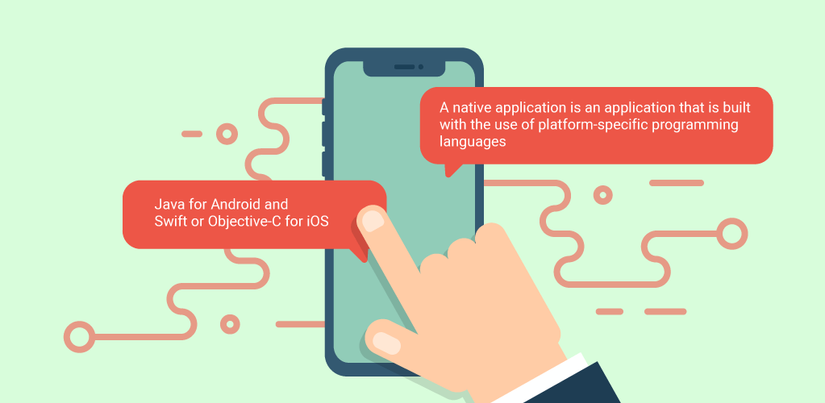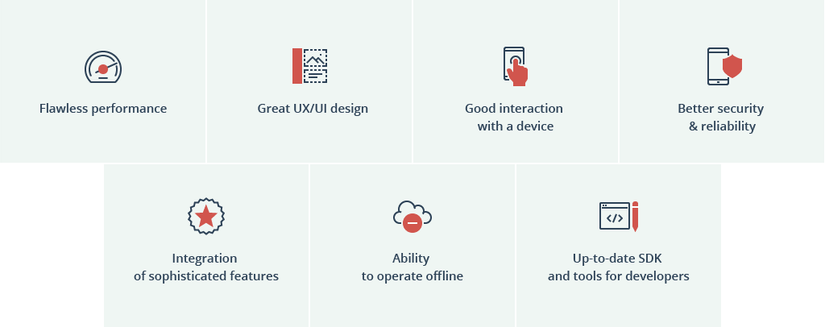Native App Development vs. Hybrid and Web App Building
Bài đăng này đã không được cập nhật trong 7 năm
A question whether to use a native app, a hybrid app or a web app is quite debatable and each option has its advantages and disadvantages. But it is very important to build a product that performs well so that your app could be successful.
In this article you will find the comparison of the unique aspects of native vs hybrid app, as well as native vs web app.
What is Native App Development?

A native mobile app is an app that is designed to fully comply with the guidelines and requirements of a particular operating system. Apps are built separately for each operating platform in native app development. Complete unity with the device and its features, like the camera, contact list, GPS, etc gives benefits to native development.
Native applications are usually downloaded from app stores (Google Play, Apple's App Store) directly to the mobile device. No external help from other tools or browsers is needed when they are launched, and they store data right in the gadget’s memory or in a cloud service.
Benefits of Native Apps

Native apps look and feel great, and operate very well, which leads to a better user experience, customer satisfaction, and retention rates.
Disadvantages of Native Applications

When it is advisable to choose native app development:
- when high app performance is necessary
- in order to keep up with competitors in instances of similar app ideas or markets
- when the app market niche is unoccupied, start with unique first product version (MVP).
- when time is on your side and it is possible to plan everything in advance and wait 6 months before app launch
- if you plan to scale and update the app on a constant basis
What is Hybrid App Development?
A hybrid app is a combination of a native and a web app and is defined as a website at heart with a native app as its external sheath. One difference between a native and a hybrid app is that the latter is developed with the help of HTML, JavaScript, or CSS at its core, and is then given a thin native shell with WebView to access the native system functionality.
Hybrid apps can be developed with the help of a range of tools and frameworks that save a considerable amount of coding time. The best tools for cross-platform app development are: Native Script, PhoneGap, React Native, etc.
Advantages of Hybrid Mobile App Development
- Cost-efficient development due to a range of ready-made components, modules, and frameworks available
- “Compile once, run everywhere” option reaches a wider audience of iOS, Android, and Windows platforms simultaneously
- Design and UX equality allows users to recognize app elements and predict navigation on different devices
- Flexible and adaptable development of UX/UI Design
- Growing support from development community (e.g. React Native)
- Less qualified software programmers are still capable of development
- Easy to work with, maintain, and upgrade
- Can be downloaded from app stores
Disadvantages of Hybrid Apps
- Possible performance issues (delays, especially with clicks, list scrolling, swipes, etc.)
- Issues with user app experience (it is hard to align the app interface across platforms with no issues)
- Issues with animation (this is extremely difficult in a hybrid environment, things may freeze)
- Lack of complete integrity with the device and OS (e.g. so-called built-in accessibility for a user with issues like a change of the font size)
- Inability to implement complex features (e.g. in-app analytics - charts, diagrams)
- Lack of reliance on the development tools (some instruments are not able to implement some functions until the framework allows)
- Inflexible hybrid development frameworks (these cannot quickly adjust to the changing tech environment and keep up with all the updates)
- Potential integration issues (e.g. advanced storage options, notification preferences, local settings)
- Need to customize apps to a large number of existing browsers
- Potential issues with app launch in the marketplace, sometimes non-native apps are denied as they cannot comply with guidelines from both OSs
In general, hybrid apps are a good solution for banks, news, media, and content delivery platforms.
Native vs Mobile Web App
A web app is a software program that uses web technologies (HTML, JavaScript, CSS), runs on a web browser, and performs tasks via the internet. Native as well as a hybrid mobile apps are available in the app marketplace, while web apps are accessible as websites via a mobile browser (Chrome, Safari, Firefox, etc.). Web apps as opposed to native applications, are another kind of a cross-functional application that can operate on all devices.
Mobile web app development can be used for simple and straightforward projects. Some mobile web app examples include: Medium, The Washington Post, Gmail, Google Docs, and Flipkart Lite.
Here you can discover more details about the differences between native, hybrid and web apps.
All rights reserved